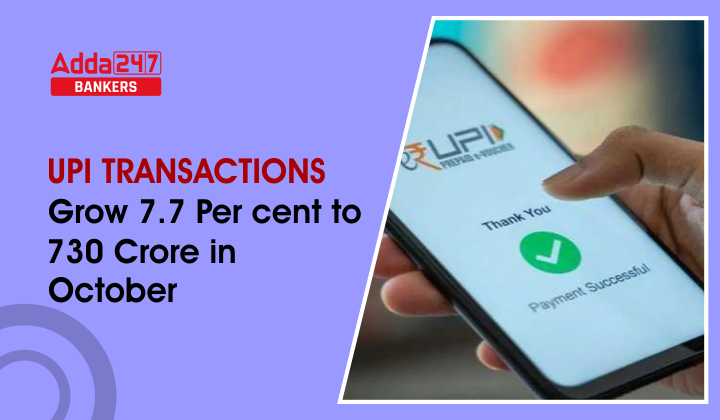UPI transactions grow 7.7 percent to 730 crore in October: The number of UPI transactions increased by 7.7% in October to 730 crore. More than 12.11 lakh crore was the total amount for the month. In September, there were 678 crore UPI transactions with a total value of 11.16 lakh crore.
News Highlights
- In October, the value of instant interbank fund transfers via IMPS transactions stood at 48.25 crore. According to monthly data from the National Payments Corporation of India, transactions increased by 4.3% compared to September.
- The NETC FASTag, which enables automatic toll collection at NHAI toll booths across the country, saw a 9.3 percent increase in transactions from 28.3 crore in September.
- While the Aadhaar-enabled AePS, which enables simple, quick, and secure banking transactions, increased to 11.77 crore in October from 10.27 crore the previous month.
What is UPI?
UPI is a system that integrates multiple bank accounts into a single mobile app (of any participating bank), combining several banking features, seamless fund routing, and merchant payments under one hood. UPI is currently the most popular of the National Payments Corporation of India (NPCI)-managed systems, which also include the National Automated Clearing House (NACH), Immediate Payment Service (IMPS), Aadhaar enabled Payment System (AePS), Bharat Bill Payment System (BBPS), RuPay, and others.
What is the National Payments Corporation of India (NPCI)?
It serves as an umbrella organization for retail payment and settlement systems in India. It is a joint initiative of the Reserve Bank of India (RBI) and the Indian Banks’ Association (IBA) under the Payment and Settlement Systems Act of 2007. Founded in 2008, it has successfully pioneered the development of a domestic card payment network known as RuPay, reducing dependence on international card schemes.
It was formed as a “Not for Profit” company in accordance with Section 25 of the Companies Act of 1956. (now Section 8 of Companies Act 2013).
What is Immediate Payment Service (IMPS)?
The Immediate Payment Service (IMPS) transfers funds from one bank account to another via the Indian banking system. The system enabled real-time, interbank electronic transfers 24 hours a day, seven days a week, where only NEFT and RTGS services were available in India. The Reserve Bank of India has approved IMPS, which is based on the National Financial Switch (NFS) and is owned by NPCI (National Payments Corporation of India). Immediate Payment Service aims to make electronic transfers simpler and more convenient for customers, as well as to support the RBI’s policy of electronic filing for store payments.
What is National Electronic Toll Collection (NETC)?
The National Payments Corporation of India (NPCI) created the National Electronic Toll Collection (NETC) program to meet the Indian market’s electronic tolling needs. It provides a nationwide interoperable toll payment solution, as well as clearing house services for settlement and dispute resolution. Interoperability in the context of the National Electronic Toll Collection (NETC) system refers to a common set of processes, business rules, and technical specifications that allow a customer to use their FASTag as a payment mode on any toll plaza, regardless of who owns the toll plaza.
What is FASTag?
FASTag is a device that uses Radio Frequency Identification (RFID) technology to pay tolls while the vehicle is in motion. FASTag (RFID Tag) is attached to the vehicle’s windscreen and allows the customer to pay tolls directly from the account linked to FASTag. FASTag provides the convenience of cashless payment as well as benefits such as fuel and time savings because the customer does not have to stop at the toll plaza.
What is Aadhaar enabled Payment System (AePS)?
The National Payments Corporation of India (NPCI) created AePS, which allows people to conduct financial transactions on a Micro-ATM by providing only their Aadhaar number and verifying it with their fingerprint/iris scan. Funds can be transferred from one bank account to another using only their Aadhaar numbers with the help of this payment system. This system adds another layer of security to financial transactions by eliminating the need to provide bank information while carrying out these transactions.




 FCI Assistant Grade 3 Previous Year Ques...
FCI Assistant Grade 3 Previous Year Ques...
 FCI Manager Previous Year Question Paper...
FCI Manager Previous Year Question Paper...
 FCI DV Admit Card 2023 Out, Download FCI...
FCI DV Admit Card 2023 Out, Download FCI...


